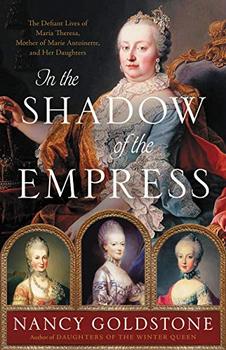Book Club Discussion Questions
In a book club? Subscribe to our Book Club Newsletter!
Please be aware that this discussion guide will contain spoilers!
- Throughout her reign, Maria Theresa strove to improve her subjects' lives. She shifted
the burden of taxation away from the peasantry by forcing the aristocracy to pay their fair
share (a visionary measure without precedent in Austrian history); she introduced
smallpox vaccination and did her best to reform healthcare and education; and she
modernized the army. But she also had many faults, chief among them her religious
intolerance and especially her hatred of Jews and adoption of anti-Semitic policies. Do
you think that, ultimately, she deserves to be remembered as a great leader, or does her
bigotry disqualify her from that distinction?
- Maria Theresa had the very modern problem of having to juggle the responsibilities of a
full-time career with her role as wife and mother. (Of sixteen children!) How well do
you think she succeeded at this delicate balancing act? It is clear that she tried to defer
to her husband's and eldest son's wishes whenever possible—how did that work out for
her? Why do you think that she, who understood how difficult it was to rule, prepared
her daughters so little for it?
- In one of her letters, Isabella of Parma counseled that, as the daughter of a great prince,
Maria Christina should dissemble her true feelings and adopt a pose of outward
obedience until such time as she would perhaps be in a better position to exert control
over her life. What do you think of Isabella's advice? Would you say that in some ways,
women are still grappling with societal expectations of meekness and compliance?
- Like her mother, Mimi espoused polices that encouraged progressively moderate
government. How do you think the history of Europe might have been changed if she,
rather than Joseph, had been allowed to inherit her mother's thrones?
- Unlike her sister Marie Antoinette, Maria Carolina worked tirelessly to improve her
subjects' lives. She improved schools, introduced smallpox vaccination, organized
prompt government relief programs for the victims of Naples's numerous earthquakes
and volcanic eruptions, established shipyards and a navy, and ushered in a golden age of
prosperity. And yet today she is as hated in Italy as Marie Antoinette is in France. Do
you think that, historically, women rulers faced a higher standard than men? Despite the
recent accomplishments of the women's movement, do you believe women in politics are
still judged more harshly than men?
- In the U.K., Emma Hamilton's influence over Admiral Nelson, and her intervention on
his behalf with Maria Carolina, is still considered (as it was in the 18th century) to be a
source of embarrassment rather than a diplomatic or military achievement. Do you agree
with that assessment? Do you consider her a heroine for overcoming a life of poverty
and forced teenaged prostitution, or an adventuress who bargained her looks and talents
to climb up the social ladder and ensnare another woman's husband?
- What do you think of Marie Antoinette's long-term affair with Count Fersen? Her
emotional and sexual relations with her husband were clearly unsatisfactory, in large part
due to Louis XVI's disorder, which neither she nor anyone else at court could have
possibly understood. Do you believe that under these circumstances, she had a right to
fall in love and experience real passion, or is this just another black mark against her?
- They say that history is written by the winners. But until very recently, it was also
written almost exclusively by men, for whom Marie Antoinette made an easy target.
Given the challenges presented by her husband's disorder, her numerous attempts to
protect him and her children, the considerable bravery she demonstrated on the three
occasions that she was attacked by the mob and during her captivity, trial, and execution,
do you believe she deserves the scorn with which she is still routinely treated?
Unless otherwise stated, this discussion guide is reprinted with the permission of Back Bay Books.
Any page references refer to a USA edition of the book, usually the trade paperback version, and may vary in other editions.
